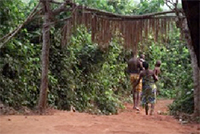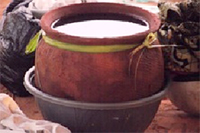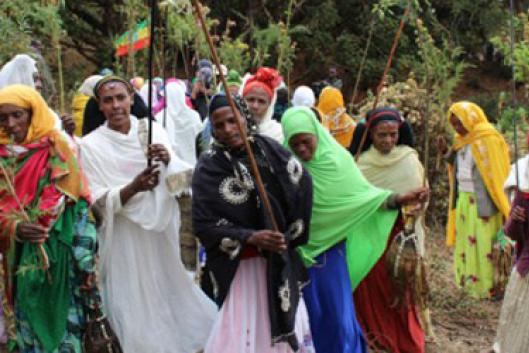“This small family, the father, the mother and their two children, enters the sacred forest in order to find solutions to the illnesses and various problems that afflict them.”
 The transformations of African societies copied from imported models and the imposition of government systems of industrialized societies lead us to think that there still are numerous elements to examine before reaching a clear and coherent understanding of the African methods of access to medical care. Indeed, the observer of the African medical “scene” is often disconcerted at the extraordinary diversity of possibilities offered by natural resources (forests and sacred spaces, water, air and land) and endogenous African knowledge. It has been necessary to turn to the much criticized “traditional authority” in order to better comprehend our cultures’ hidden potentialities, that allow us to safeguard the veneration of diverse divinities, the knowledge and use of plants and incantations, as well as exchanges between generations.
The transformations of African societies copied from imported models and the imposition of government systems of industrialized societies lead us to think that there still are numerous elements to examine before reaching a clear and coherent understanding of the African methods of access to medical care. Indeed, the observer of the African medical “scene” is often disconcerted at the extraordinary diversity of possibilities offered by natural resources (forests and sacred spaces, water, air and land) and endogenous African knowledge. It has been necessary to turn to the much criticized “traditional authority” in order to better comprehend our cultures’ hidden potentialities, that allow us to safeguard the veneration of diverse divinities, the knowledge and use of plants and incantations, as well as exchanges between generations.
The imported medicine, here referred to as “modern medicine”, has often demonstrated its limitations. The application of a true strategy of healing and soul liberation is not based solely on the excessive administration of pills, but rather implies controlling the endogenous causes of illness; that is what determines the “fâ” (1) consultation. In these places, when medicine has shown its limits, the forest has provided conclusive answers.
It is evident that the current proliferation of pharmacopoeia promoters and their relation to ancestral rites and customs cannot be prohibited, for that would be contrary to the functioning logic of a normal society that seeks to defend its identity. However, it is regrettable that the plurality of methods does not automatically guarantee the absence of disturbing deviations of conduct, even more when considering that the influence of imported religions begets other forms of social order and commitment, and whose influence on natural resources, especially forests, has been widely demonstrated. Africans are rediscovering the need to protect their patrimony, especially their forests, for it represents for them healing and heritage from ancestors. In Benin and many other countries of the continent, 80% of the population turns to pharmacopoeia for healing.
The Gbèvozoun forest of the Bonou commune in Benin is a clear example of the resistance of communities against savage land grabs by national and foreign industrialists. With the Gbèvonon (2) and the king of Bonou in the lead, local communities have maintained their ancestors’ tradition, thus succeeding in keeping away the vultures of the land.
 “Miracle water extracted from the spring after ceremonies to treat disease and cure curses.”
“Miracle water extracted from the spring after ceremonies to treat disease and cure curses.”
But this does not take into account the power of money, which manifests itself in the sale of consciences, corruption and violation of use and custom due to acculturation and uncontrolled fractioning of space.
On the other hand, one can see a resurgence of traditional authority, increasingly praised and newly revaluated. Effectively, given that public institutions have not been able to offer the population with affordable quality medical care, the resurgence of traditions presents itself as more of an opportunity than as an alternative. In this context, traditional authorities, formerly accused of obscurantism and feudalism, now count with the particular attention of part of the communities, which rediscover them and ceaselessly turn to them for the restitution of the social order.
In spite of the frameworks imposed on African societies and the artificial partition of the continent, the multiple ideologies of the continent keep exerting a major influence on the orientation of community customs. Fortunately, in spite of the differences among traditions and the persistent intrusion of exogenous forces, the impact of endogenous beliefs remains strong. Endogenous knowledge has provided, in many cases, conclusive results.
On the other hand, the forms of governance implemented by public institutions, copied from other models, have not been able to truly respond to the fundamental demands of traditional African societies, nor do they enjoy the legitimacy of the institutions established by ancestors, to which the communities keep turning.
Conclusion
Regarding the treatment of illnesses and the community traditions in this respect, one of the most shared values nowadays is represented by nature, which integrates, apart from conventional knowledge, beliefs, rites and rituals, sacrifices and prayers. For the sake of responding to a basic need, endogenous African knowledge deserves to be valued, erected in norm, organized and framed but without denaturing it, by incorporating qualitative and quantitative changes.
Individuals should acquire conscience for self-realization through their culture and identity, starting by reinforcing the vision of a broader education on their patrimony, or jowamon (3). Such is the function fulfilled by the “Graine Future” [Seeds of the future] experiential environmental education program, developed by GRABE–BENIN and Nature Tropicale, especially aimed at African youths. (4)
Coffi Fiacre NOUWADJRO, coffifiacre@yahoo.fr
Appolinaire OUSSOU LIO, aoussoulio@gmail.com
African Biodiversity Network, http://africanbiodiversity.org/
(1) Which serves as a transmission corridor between the visible and invisible worlds, with the purpose of accessing the spiritual and ancestral dimension of the realities that escape our understanding and for which we humans have no answer.
(2) Spiritual leader of the forest.
(3) In the local Benin language, jowamon means heritage or patrimony.
(4) http://grabenin.blogspot.nl/2014/02/programme-graine-future-kotan-un.html
